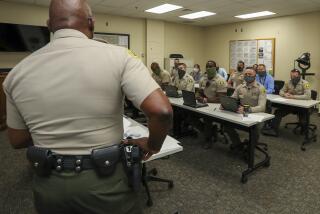Most Escape Brush With ‘Michelangelo’
- Share via
SAN FRANCISCO — The environmental group Save the Whales will have to redo its latest monthly newsletter and some unlucky video game aficionados will be forced to disinfect their home computers and buy new software.
But for the most part, computer users worldwide Friday dodged the much-awaited Michelangelo virus--a rogue computer program designed to destroy personal computer files on March 6, the 517th anniversary of the great Italian artist’s birth.
“The crisis was mainly averted,” said Marty Tibor, president of Synapse Data Recovery in San Rafael. “Most people who had data to lose took precautions.”
Most large business and government organizations used anti-virus software to preempt any threat. The virus wiped out data on thousands of personal computers around the world, but most of the victims were small businesses and home computer users who ignored or somehow missed wave after wave of warnings about the virus.
At Venice-based Save the Whales, Maris Sidenstecker, co-founder of the group, said she had heard the warnings but didn’t take them seriously.
“You always think it’s not going to happen to you,” said Sidenstecker, who reported that the text of the group’s newsletter was wiped out by the virus.
U.S. officials said they were unaware of any damage to government or military computers as a result of the virus. The German government said about 80 computers were hit in that country, but there were few incidents elsewhere in Europe, where the virus is believed to have originated.
One of the worst outbreaks was in South Africa, according to Charles Rutstein, staff researcher at the National Computer Security Assn. Rutstein said that about 1,500 computers--mostly in pharmacies that share information--were affected. The pharmacists probably infected each other’s systems during their frequent communications.
Rutstein said media reports had exaggerated the Michelangelo threat but that the heavy publicity had helped limit the damage.
“The press blitz worked,” he said. “We killed a lot of viruses last week.”
There are more than 1,000 known computer viruses such as Michelangelo, bits of software code written by pranksters then secretly attached to legitimate programs. They are spread via shared computer software, but can usually be eliminated with inexpensive anti-virus computer programs.
Symantec, the leading seller of anti-virus software, said it had distributed 250,000 copies of a free program designed specifically to kill the Michelangelo infection. Rod Turner, executive vice president of the company, said about 15,000 of the people who had received the program actually found a virus.
Sales of the company’s standard anti-virus package, meanwhile, have boomed. “We can’t produce enough to meet demand,” he said. “I’m kicking myself for not producing more in advance.”
The virus scare was also good for the Byte Gallery, a software retailer and service firm in San Diego. On Thursday, the company gave away 370 copies of a program that kills Michelangelo, a promotion that generated extensive broadcast and print publicity for the firm.
Most large businesses and government organizations have programs in place to screen for viruses, and thus Michelangelo was not a significant threat.
Although many thousands of different computer viruses are believed to be in circulation around the world, Michelangelo emerged as a threat in part because it could not be detected by most standard anti-virus programs. And unlike most viruses, Michelangelo destroys all information stored on a computer’s hard disk drive in a way that makes it impossible to recover.
John McAfee, chairman of the Computer Virus Industry Assn., said that computer users who have lost valuable data to Michelangelo might be able to recover some of it with the help of a data-recovery service. But he noted that such services are expensive and that the odds of success are not great.
Most virus victims, he said, will simply have to start over by reloading their machines with clean software and re-entering all the information.
Many computer professionals said the Michelangelo scare could have some benefits by calling attention to the danger of viruses and the simplicity of the solutions. “People just have to learn to live with these problems,” said Rutstein. “It’s not something that they have to worry about all the time.”
But that’s small comfort to Marshall Goldberg, a Los Angeles screenwriter who lost all the computer games and programs on the computer he bought three weeks ago for his kids. “I’m furious at the people who would do this kind of thing,” he said.
Times staff writers Jube Shiver Jr. in Los Angeles, Dean Takahashi in Costa Mesa and Chris Kraul in San Diego contributed to this report.






